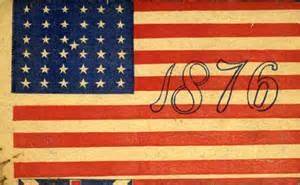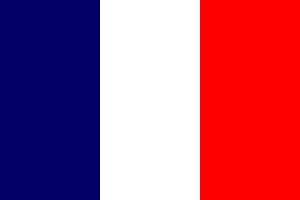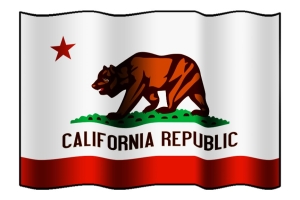Early Pioneer French Jews of California
“Pioneer French Jews arrived in San Francisco as early as 1850. Later, the Franco-Prussian War, 1870-1871), with its tragic termination obliged all the people of Alsace-Lorraine to either leave their homes or become German citizens. The two provinces had large Jewish communities at that time and all who could possibly leave did so. They went to Paris or the United States. In the 1880s and 1890s, Jewish French Pioneers were, for the most part, prospering as merchants up and down the coast. Although they identified themselves with all civic endeavors, still they retained much of their French culture and ways of living. When you entered their homes, you found yourself in France. The language, the arrangements of the furnishings, the books and periodicals, in short, the way of life, were all French. The French theatre flourished and the social life was politely exclusive.”
— Mrs. Jules (Rachel) Kauffman
B. Davidson, agent for the Rothchilds, established a bank in a wooden shack in San Francisco in June 1850. This was subsequently destroyed in one of the prevalent fires that, from time to time, swept over the city.
1851 saw the arrival of Lazard Frères, importers of French goods. Later, due to the vast business with the miners in the Gold Country, 150 miles to the east, Lazard Frères grew into an international investment bank. That same year, two great fires caused the Lazard brothers to lose 100,000 dollars — quite a sum in those days.
Some of the early pioneers found temporary shelter in San Francisco in tents pitched on the beach south of Market Street or on the heights of Bush Street. This latter location was known as French Camp.
From November 1849 to June 1850, 35 French ships arrived at San Francisco. There were many French Jewish passengers on these ships.
H. Lyons operated a large store at Sonora, which was the rendezvous of the French colony in that area. Lyons had organized a post office, sending messengers twice weekly for letters to be distributed to the various mining camps. Years later, a son, E. G. Lyons, established a business in San Francisco dealing in cordials.
The arrival of women in California brought the need for refinements to be added to the crude primitive scene. Silks, soaps, wines, olive oil, and novelties were imported from France. To this day, the French influence is felt in the cuisine of San Francisco and in the elegance of its women.
Soon the French Colony organized a theatre and a library of five thousand volumes. In 1852, a French newspaper was published.
Among the leaders of the French Colony in San Francisco in 1860 was Alexander Weill who, with his brothers Sylvain and Leon, founded the famed White House.
Most of the colony attended Congregation Ohabai Shalome (Mason Street Shule), an 1863 breakaway from Congregation Emanu-El, which occupied a building on Mason Street completed in 1865 and occupied until 1898, not Emanu-El, where the German Jews worshiped.
In 1860, the French Benevolent Society was organized with Elie Lazard as president and treasurer. When he returned to France in 1866, Alexander Weill succeeded him. When Elie Lazard left San Francisco, a great banquet was given for him and marked the high esteem in which he was held. His brother, Sylvain Lazard, remained in San Francisco until 1872. When he died, his remains were returned to France for burial. A brother-in-law, A. Aaron, and his wife, also resided in San Francisco.
In the 1870’s, Alexander Weill created a Sick Fund and donated $500 to it. He and his wife were for years the benefactors of the San Francisco French Colony, both for Jews and gentiles. They departed for France in 1880.
Among the leaders of the French Benevolent Society were: L. Herman, 1850-1852, Elie Lazard, 1862-1865, E. Kohn, 1865-1866, L.G. Salomon, 1868-1869, and Alexander Weill 1869-1872, 1878-1880.
Now appears the name of Simon Levi, gallant gentleman, importer, uncle of Mrs. Jay B. Jacobs and Mrs. Eugene Willard of Los Angeles, and Bertrand Levi of San Diego.
In 1860, the Los Angeles French Benevolent Society was founded.
In Los Angeles, J. Ruef was among the founders of the French Hospital.
The Ladies French Benevolent Society was established in 1868. Among the names listed are Mmes. Constant Meyer, president; H. Kahn, treasurer; Miss Hl. Beer, secretary; and Mmes. J. Wolf and A. Strauss.
Many from the city of Phalsbourg came to San Francisco, including Joseph Godchaux, Emanuel Roos, Solomon Reiss, Alfred Cahen, the Kahn brothers — Maurice, Jules, Henri, and Charles — and the Kauffman brothers — Isaac, Jonas, Leon, and, later, Jules.
In 1875, a Loan Society was organized with Emanuel Roos as president.
The Committee for French War Relief included Joseph Aaron and Alexander Weill of San Francisco as officers, and Nathan Cahn, Joseph Coblentz, P.N. Roth, and Eugene Meyer of Los Angeles as directors. Other directors were E. Blum, A. Loeb, and L. Goldsmith of Sacramento, A. Strauss, L. Lion and Waldteufel of San Jose, M. Levy of Winnemucha, E. Cerf of San Luis Obispo, M. Haas of Hamilton City, and Achille and Moise Kahn of Petaluma.
In San Francisco, a huge bazaar was held for the benefit of the statewide French War Relief Organization. Heading the affair were Mmes. Alex. Weill, A. Blochman, David Aron, Elizabeth Levy, Joseph Aaron, C. Levy, Mathilda Blum, Emanuel Roos, and Mrs. C. Levy and Hortense Blum. As a result of the five-day bazaar,Mms. Matilde Blochman, treasurer, announced a profit of $50,034.50 — a lot of money for those days. This was sent to France for war relief.
On the Women’s Committee were Mmes. Alex Weill, Leopold Cahn, Joseph Aaron, Emanuel Roos, F. Godchaux, Moise Cerf, Jules Meyer, Rosene Goldsmith, and Jules Cerf. Bazaars and theatricals followed one after the other for the same purpose.
In Los Angeles, a picnic was held in the Arroyo Seco with Mmes. Eugene Meyer, president, P.N. Roth, L. Loeb, Joseph Coblentz, and Bouelle, which netted the sum of $584.45. On that same committee were Mmes. Philip Meyer, Rachel Kremer, and Miss Meyer.
The sum total raised by the French Central Committee of California for French War Relief was $281,683.59.
In 1868, Mr. Salomon Reiss was the Treasurer of the Lafayette Guards.
A Circle Francais was organized in Los Angeles in 1860, with Mr. Edward Blum as Secretary.
Leon Weill returned to France early in the war to join the Army of Napoleon III.
In 1884, the Circle Francais was organized in San Francisco with 125 members. Jules Kahn was treasurer, Edmond Godchaux was secretary, and Isidore Levy, E. Meyer, and Leon Weill were directors.
A touching incident took place in the late 1870’s. Elie Alexandre, a member of the colony, a lieutenant of the Lafayette Guards of San Francisco decorated at St. Helena, died. His funeral was a patriotic demonstration. Rabbi Elkan Cohn of Temple Emanu-El in his funeral address, said:
“Mr. Alexandre was an honest man and a great patriot. He had the sorrow of seeing his beloved France stricken and died too soon to see her restored to the rank she deserved among the nations of Europe.”
Another patriot who returned to France to fight was Sylvain Weill.
Many French Jewish families were scattered throughout the state, and some built important businesses.
In the middle of the state were the Meyer brothers: Alexander, Leopold, and Gabriel.
In San Francisco, the Kahns brothers — Charles, Jules, and Henry — were importers. The Kauffman brothers — Leon, Jonas, Isaac, and Jules — were merchants of San Francisco and Los Angeles.
The Roos brothers — Bernard and Salomon — Lazard Klein, Leon Blum, Daniel Roth, Daniel Levy, B. Halgarten, Joseph Roth, Adolphe Roth, Alfred Cahen, Solomon Bien, Prosper May, and the Godchaux family were all in San Francisco.
In Lompoc, Santa Barbara County, were the Weils, the Coblentz family, Achille Kahn, and Armand Lehmann.
In Santa Barbara were Joseph Levy, his sons Michel and Adolph, and four daughters, as well as Cerf Levy, his sons Joseph and Leon, and daughter Rachel (Mrs. Jules Kauffman).
In Ventura County, we find Jacques Roos, Leon Cerf, Joseph Roth, Moise Wolf, Leon Lehmann. Matilde, Paul, and Edmond Lehmann were in Hueneme; Achille and Henry Levy were the bankers of Oxnard.
In Los Angeles, we find Edmund Roth, Simon Cahn, Leon Loeb, Solomon Lazard, Maurice Kremer, Michel Levy and his son Isaac, Adolphe Roth, Arthur P. Lazarus, and Eugene Levy.
In Petaluma was Moise Kahn.
In Newman, California, was Alfred Cahen.
Source
- Norton B. Stern, “Pioneer French Jews in California,” Western States Jewish History 46/1.
==========================================
Jews in the News
Around this Time
Hebrew Benevolent Society, Sonora, California — 1856
Sonora, California — The Israelites residing in Sonora have formed themselves into a benevolent society with the following officers: H. Wolf, president; Michel Goldwater, vice president; M. Seeligsohn, secretary; I. Joseph, treasurer; Elias Gumpert, H. Cohen and Moses Hanauer, trustees. The Columbia Gazette says: “We are glad to learn that the society of our Jewish fellow citizens is in a flourishing condition. An improved enclosure is in progress of construction around their burial ground, and other objects of interest to them are receiving attention.
“Many excellent citizens of our county [Tuolumne] belong to the ancient faith, from which we ourselves draw so many good precepts. They are thrifty, peaceable, law-abiding people, always able to take care of themselves, never appealing to others for aid or assistance, and making a dollar where we could not find a dime. Through all the ignorant prejudice that unfortunately still lingers towards them, they are now fast claiming, through their merits as good men, the respect and regard of all enlightened people. We offer our good wishes for the continued success of the Hebrew Benevolent Society of Sonora in its mission of charity and good-will.”
— The Occident, Philadelphia, April 1856 [WSJHQ 15/4]
==========================================



